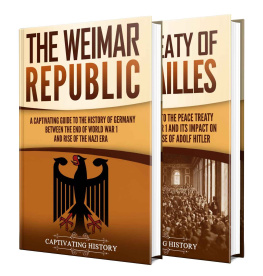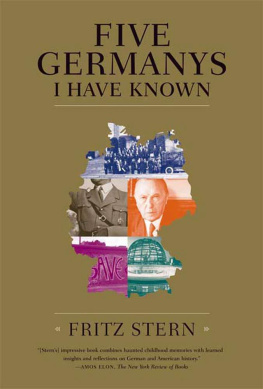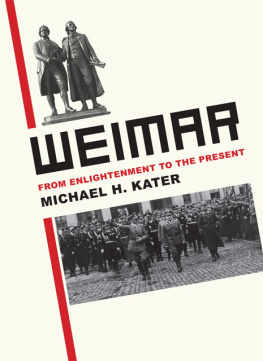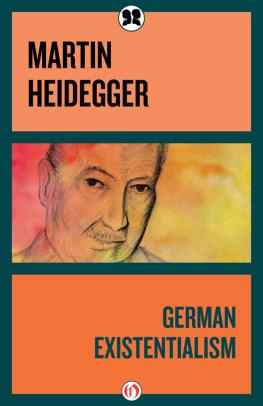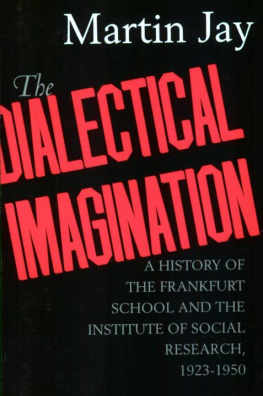Routledge Revivals
The Burden of German History 1919-45
Originally published in 1988, The Burden of German History 1919-45 examines the vast literature surrounding Weimar years and the National Socialist tragedy, daunting even for the specialist historian or political scientist. The essays included in this volume provide an invaluable guide to research of the time and provides a stimulating review of a wide range of topics in modern German cultural, political, economic and military history. The essays are based on a series of lectures given by German and Irish scholars to a conference on the theme Weimar Germany and National Socialism, which was held in March 1986 in University College, Dublin, under the auspices of the Goethe Institute, Dublin. This book offers a significant commentary on a period of German history which included the exciting and ambivalent freedom of the Weimar society and the repressive, murderous uniformity of National Socialism.
First published in 1988
by Methuen London
This edition first published in 2019 by Routledge
2 Park Square, Milton Park, Abingdon, Oxon, OX14 4RN
and by Routledge
711 Third Avenue, New York, NY 10017
Routledge is an imprint of the Taylor & Francis Group, an informa business
1988 Goethe Institute Dublin
All rights reserved. No part of this book may be reprinted or reproduced or utilised in any form or by any electronic, mechanical, or other means, now known or hereafter invented, including photocopying and recording, or in any information storage or retrieval system, without permission in writing from the publishers.
Publishers Note
The publisher has gone to great lengths to ensure the quality of this reprint but points out that some imperfections in the original copies may be apparent.
Disclaimer
The publisher has made every effort to trace copyright holders and welcomes correspondence from those they have been unable to contact.
ISBN 13: 978-0-367-33671-4 (hbk)
ISBN 13: 978-0-429-32117-7 (ebk)
The Burden of German History 1919-45
Essays for the Goethe Institute
The Burden of German History 191945
Essays for the Goethe Institute
Edited by Michael Laffan
First published in Great Britain 1988
by Methuen London Ltd
11 New Fetter Lane, London EC4P 4EE
Copyright 1988 Goethe Institute Dublin
Printed in Great Britain by
Redwood Burn Ltd,
Trowbridge, Wiltshire
British Library Cataloguing in Publication Data
The Burden of German History 1919-45:
Essays for the Goethe Institute.
1. Germany History 19191933
2. Germany History 19331945
I. Laffan, Michael II. Goethe-Institute (Dublin)
943.085DD237
ISBN 0 413 40560 5
Imanuel Geiss, Professor of Modern History in the University of Bremen, is the author of German Foreign Policy, 18711914, July 1914: the Outbreak of the First World War, The Pan-African Movement, a six-volume world history, and numerous other publications.
Peter Hoffmann, after an academic career in Germany and the United States, is now Professor of German History in McGill University, Montreal. He is the author of the standard History of the German Resistance, 19331945 as well as of many articles on the resistance movement.
Eberhard Jckel is Professor of Modern History in the University of Stuttgart. His publications include Hitler in History, Hitlers Weltanschauung: a Blueprint for Power, Frankreich in Hitlers Europa, and Hitlers Herrschaft.
Peter Labanyi was formerly German editor of the Times Literary Supplement and now lectures in the National Institute of Higher Education, Limerick. He has published articles on several German writers and is at present editing and translating Alexander Kluges ffentlichkeit.
Michael Laffan lectures in University College, Dublin. He has researched and lectured on aspects of Weimar German history, and is the author of The Partition of Ireland, 19111925, as well as of several articles. He is Secretary of the Irish Historical Society.
J. Joseph Lee, Professor of Modern History in University College, Cork, is the author of The Modernization of Irish Society, 18481918 as well as of studies on Labour in German Industrialization, Urbanization and Economic Development in Germany, and German Agriculture during the First World War.
Hans Mommsen is Professor of Modern History in the University of Bochum. His many publications include Klassenkampf oder Mitbestimmung: zum Problem der Kontrolle wirtschaftlicher Macht in der Weimarer Republik, Beamtentum im Dritten Reich and Sozialdemokratie zwischen Klassenbewegung und Volkspartei.
Hugh Ridley, Professor of German in University College, Dublin, is the author of Images of Imperial Rule and Industrie und deutsche Literatur as well as of studies on writers such as Thomas Mann, Ernst Jnger, Gottfried Benn and Walter Benjamin.
Eda Sagarra is Professor of German in Trinity College, Dublin. Her publications include An Introduction to Nineteenth-Century Germany, German Literature and Society, 18301890, and A Social History of Germany, 16481914.
Kurt Sontheimer, Professor of Political Science in the University of Munich, is the author of many books on modern German Politics and Society, among them Antidemokratisches Denken in der Weimarer Republik, Das Elend unserer Intellektuellen and The Government and Politics of West Germany.
The twelve articles in this collection are based on papers delivered to a conference on Weimar Germany and National Socialism, 19191945, which was held in University College, Dublin, in March 1986. The conference was the result of an initiative by the Goethe Institute Dublin, and it was organized and presented jointly by the Institute and by the Department of Modern History, University College, Dublin, under the direction of Dr Dietrich Kreplin and Professor Kevin B. Nowlan.
The widespread interest which it provoked, the large attendance at the lectures, and numerous requests for the text of the papers, all reinforced the organizers wish to publish the proceedings of the conference. This volume is the result.
The contributors are Irish and German scholars who belong to several different disciplines and represent a wide range of approaches to their subjects. Some of them break new ground while others synthesize recent research and interpretations. However, one theme runs through most of the chapters: the strong lines of continuity which link different phases of German history and which both underlie and transcend the dramatic changes of regime. The importance of symbolic dates such as 1918/19, 1930/33 or 1945/49 can be exaggerated, and a concentration on turning-points can distract attention from long-term movements or trends.


